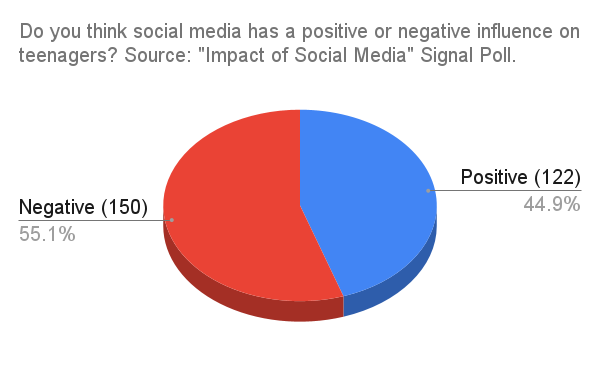EDITORIAL: Caution – social media ahead

Source: “Impact of Social Media” Signal Poll.
Out of 272 Total Respondents 55.1% felt Social Media Effecting them negatively.
November 21, 2022
The usage of social media has rapidly increased over the past years. Generations are beginning to grow more and more attached to it. Phones are becoming harder to put down and social media is growing its influence on today’s society. The Signal staff believes the negative impact is far outweighing the positive impact.
According to the Statista Research Department, “During a fall 2021 survey, it was found that Snapchat was the most important social network for 35 percent of U.S. teens. Fast-growing social video app TikTok was ranked second with 30 percent of teenagers in the United States stating it to be their favorite, ahead of legacy platforms Facebook and Twitter.” Phones have become a distraction in daily lives. Kids may refuse to put down their phone or give up their phone to teachers or parents. According to Pubmed.gov, ”The term NOMOPHOBIA or NO MObile PHone PhoBIA is used to describe a psychological condition when people have a fear of being detached from mobile phone connectivity.”
The phone’s distractive use is taking its toll on today’s society. The like button has become almost toxic to people, especially younger generations who use social media more. They become infatuated with how many likes and comments they receive and because of this, it’s shifting the way people perceive themselves. In a recent study at the College of Journalism and Communications through the University of Florida, “Findings showed that more frequent upward comparisons reduced positive feelings, leading social media users to feel worse about themselves. In other words, by comparing themselves to people who were perceived to be doing better in life, users came away with deflated self-esteem.”
Acknowledging that you are a part of this addiction is the first step into treating it. Dr. Jennifer Golbeck is a professor at the University of Maryland and came up with a nine question survey on Pshycologytoday.com about your technology usage. If you answer yes to five or more of these questions, you are a qualifier of a “disordered social media user.” The questions consist of:
- Have you regularly found that you can’t think of anything else but the moment that you will be able to use social media again?
- Have you regularly felt dissatisfied because you wanted to spend more time on social media?
- Have you often felt bad when you could not use social media?
- Have you tried to spend less time on social media, but failed?
- Have you regularly neglected other activities (e.g. hobbies, sport) because you wanted to use social media?
- Have you regularly had arguments with others because of your social media use?
- Have you regularly lied to your parents or friends about the amount of time you spend on social media?
- Have you often used social media to escape from negative feelings?
- Have you had serious conflict with your parents, brother(s) or sister(s) because of your social media use?
Movies such as Netflix’s “The Social Dilemma” have examined this topic and it’s evident that the algorithm developers produce is crafted to create a toxic, addictive relationship between teenagers and social media. This exact scenario is what developers intend to happen, and they feed off these addictive toxic qualities of their applications. App developers reel them in and keep them attached by producing unrealistic expectations of what they should be looking like, creating ‘Snapchat dysmorphia’. This disorder occurs when younger generations feel dysphoric realizing their faces in reality do not line up to the one found in photos using filters. It’s no wonder why social media has greatly affected younger generations.
The Signal Staff created and distributed a survey, “Impacts of Social Media” to our students. We received 271 different responses. According to the results, one anonymous student feels that social media emotionally affects them, “I get very angry with some of the discriminatory posts or posts where people are bullying other people. I also get upset with the picture that social media paints about how all women should look and how unrealistic it is”. About one third of the respondents mentioned the standards of body image. Others had brought up the topic of cyberbullying and spreading fake information or even others personal images. With the responses it makes the Signal Staff come to the conclusion that maybe it’s not the social media platform itself, but the people who are using it. One question asked “Do you think social media has a positive or negative influence on teenagers?” and 55.1 percent said it made a negative impact while the other 44.9 percent said it made a positive one. More than half of the respondents mentioned how social media does not impact them in a negative way but also in an entertaining way. Social media can also provide entertainment for us that we can’t easily access if we were not using our phones to access it. “It’s a good way to kill or burn time sometimes” another anonymous response mentioned.
Out of 118 respondents who identified as males, 43.5 percent said social media does not impact their lives. Although some did respond with no, other responses were based on how the platform is entertaining or how the platform is a place to find news that’s going on in the world. Comparatively 48.3 percent of female responses said the platform affects body dysmorphia. People with this disorder may constantly examine their appearance in a mirror, imaging or examining flaws, and they may avoid social situations or photos. There were also responses containing either serious or disrespectful messages that are sent through the phone. People who are using social media can easily send whatever they want while behind a screen. These messages can affect people’s emotions or even contribute to affecting their daily lives.
The Signal Staff feels that putting down your phone once in a while may not be the worst idea. Instead of checking the weather on your phone, go outside and check instead. Ask to hang with your friends instead of pulling up Snapchat. Do not feel like you have to live up to other people’s standards. Create your own and be the best version of yourself you can be.





